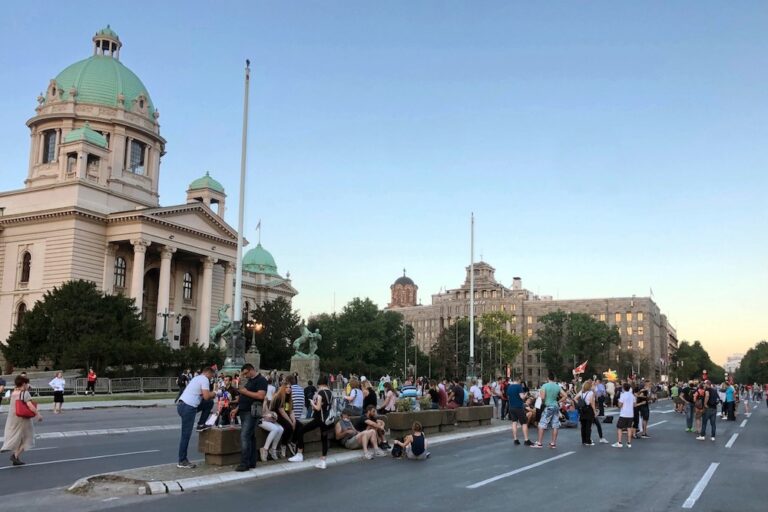(WPFC/IFEX) – The following is a WPFC letter expressing concern over plans for a media control system in Kosovo: **Updates IFEX alerts of 23 June and 22 June 1999** His Excellency Kofi A. Annan Secretary General United Nations His Excellency Knut Vollebaek Chairman Organization for Security and Cooperation in Europe cc: OSCE Secretary General Jan […]
(WPFC/IFEX) – The following is a WPFC letter expressing concern over plans
for a media control system in Kosovo:
**Updates IFEX alerts of 23 June and 22 June 1999**
His Excellency Kofi A. Annan
Secretary General
United Nations
His Excellency Knut Vollebaek
Chairman
Organization for Security and Cooperation in Europe
cc: OSCE Secretary General Jan Kubis
Assistant Secretary of State Harold Koh
Kensaku Hogen, UNDPI
Dear Sirs:
It is with great dismay that the WPFC learns of plans for a media control
system in Kosovo.
Despite the negative impact of similar measures taken by the Independent
Media Commission in Bosnia, the Organization for Security and Cooperation in
Europe (OSCE) – with the blessing of the United Nations – appears intent on
imposing prescriptions upon the once free and independent news media of
Kosovo.
We express this concern on behalf of the World Press Freedom Committee,
which includes 44 journalistic organizations on six continents.
As an organization committed to a free press and a free flow of news
everywhere, we must object to the establishment by OSCE of a so-called Media
Affairs Department (MAD), which would write codes of practice for print and
broadcast news media, and “monitor compliance and establish enforcement
mechanisms.”
From the outset of allied decisions to create a media control system in
Bosnia, the World Press Freedom Committee and others have warned that this
would serve as a dangerous precedent for UN operations elsewhere –
specifically, in Kosovo. This has now proven to be the case, despite
widespread warnings that the controversial and inconclusive Bosnia
experience should not be repeated in Kosovo.
This new agency (MAD) has recently been created at the request of UNMIK
(United Nations Mission in Kosovo). It is already in operation in Kosovo
under a Director of Media Affairs, Douglas Davidson.
While OSCE sources say the new agency’s most urgent task is to allocate
frequencies and to issue broadcast licenses to the large number of radio and
television projects in Kosovo, the new agency has proposed – in an OSCE
“concept paper” outlining what is planned – to assign itself a great many
other powers, including creation of:
– A “Media Regulatory Commission” for both written and broadcasting press to
write and administer a “Broadcasting Code of Practice” and “a temporary
Press Code” for printed media, and “monitor compliance and establish
enforcement mechanisms”;
– An “international appellate body” which would write media laws and
regulations and to which Kosovar media could appeal commission rulings;
– An “Independent Media Council” (a title similar to the one used by allied
authorities in Bosnia), including Kosovar journalists and others, to advise
the OSCE;
– A “Media Monitoring Division” to report on compliance with the codes and
“track the treatment of journalists, as well as responsible behaviour by
journalists” and refer cases to human rights and/or police authorities.
Thus the OSCE’s new Media Affairs Department (MAD) would write the new rules
for the media and serve as both judge and jury in their enforcement.
We understand that the UN and the OSCE have given up plans to create their
own radio stations in Kosovo, but that the UN and other international
organizations intend to produce their own programs for use by Pristina
Radio-TV. Meanwhile, the NATO command in Kosovo has already allocated
wavelengths for itself.
Documents indicate that the Council of Europe has been asked to provide
media lawyers for MAD, apparently to draft laws and regulations. MAD’s table
of organization calls for a staff of 50, plus a Pristina Radio-TV management
team. The new agency also apparently intends to position itself as a
clearing house for outside aid to Kosovar media, and would tell donors which
media outlets it onsidered needy and deserving.
Such plans, unfortunately, do not advance the independence of news media – a
stated goal of the allied groups working through the United Nations in
Kosovo. Such provisions for regulation are, in fact, in conflict with the
principles of democracy and freedom that the United Nations is pledged to
uphold.
Prior to Kosovo’s catastrophic civil war, a free press functioned there.
While financial assistance would be welcome for rebuilding printing houses
and broadcasting facilities, foreign direction in how to operate them is
neither needed nor desirable. It could, in fact, defeat the purpose of
helping independent media to flourish once again in Kosovo.
Thank you for your attention.
Sincerely,
James H. Ottaway, Jr.
Chairman
Recommended Action
Similars appeals can be sent to:
Appeals To
His Excellency Kofi A. Annan
Secretary General
United Nations
Fax: +212 963 4879His Excellency Knut Vollebaek
Chairman
Organization for Security and Cooperation in Europe (OSCE)
Fax: +431 514 3610His Excellency Jan Kubis
OSCE Secretary General
Fax: +431 514 361 05
Please copy appeals to the source if possible.


